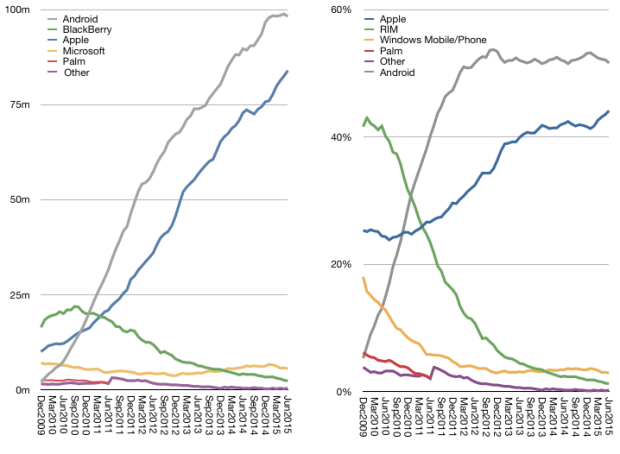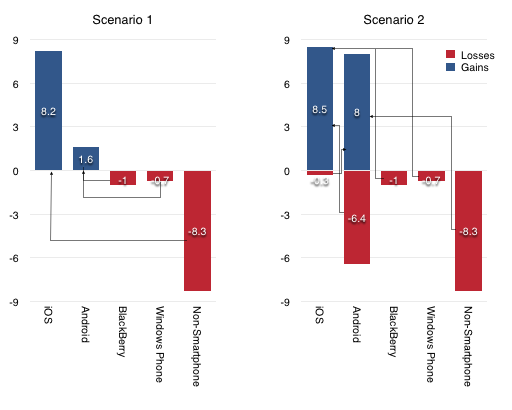During the last quarterly earnings call, Tim Cook said that Apple has seen the highest switching rate from Android ever. That there is switching isn’t surprising. We’ve seen many surveys which show higher loyalty with iOS than with Android. But it’s been very hard to spot the evidence in the data which is visible publicly. Both iOS and Android are adding users and sales for both platforms are still increasing.
The switching effect is easier to discern when the market is not growing overall. In that situation one platform’s growth has to be at the expense of another. However, some markets do show evidence of “churn” in users.
Consider the ComScore data on US platform users (above). If we look at the last six months’ data1 we can count that there are about 8.2 million more Americans using iPhones than there were six months ago. At the same time, there are 1.6 million Android users. One million users left the BlackBerry platform and about 700,000 left Windows Mobile. The data also suggests that the total number of first-time smartphone users is about 8.3 million.
Now, we could say that Android recruited all the Windows and BlackBerry users that switched (1.6 gained equivalent to 1.7 million lost) and Apple recruited all the new-to-smartphone users (8.2 million gained by Apple vs. 8.3 million non-consumers).
But this is not very plausible. It’s much more likely that Apple converts existing smartphone users while Android converts first-time users.
In this scenario, 8 million non-users first started using Android while 1.7 million BlackBerry and Windows users switched to iPhone. But that leaves the question of what happened to the missing 6.3 million that Apple should have gained.
That’s where the switching number comes into the picture. This Scenario 2 is shown in the figure above and suggests that although Android gained 8 million new users, it lost 6.4 million to iPhone for a net gain of 1.6.
Apple may have also lost a few users to Android but overall gained switchers from other platforms, mainly Android. This is what would support Tim Cook’s comments.
Thinking further ahead, as the markets mature globally, they may well evolve into the way the US market evolves today. Apple’s brand promise ensures loyalty while competing platforms slowly “leak” users. If this sounds eerily familiar then you’d be right. This is exactly how the PC market behaves today.
- these data are actually three month averages [↩]
Discover more from Asymco
Subscribe to get the latest posts sent to your email.


